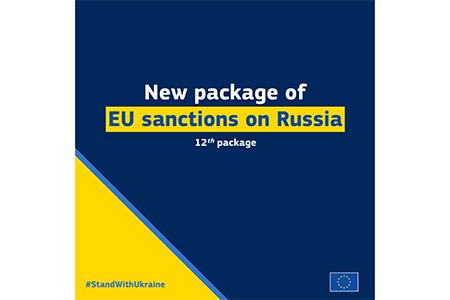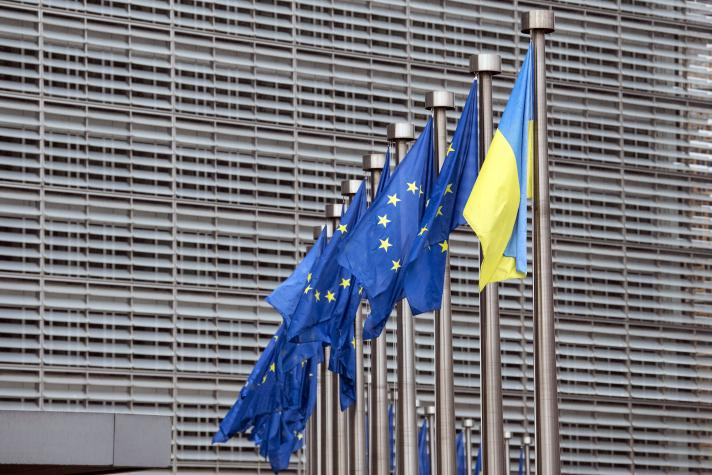
The Commission welcomes the Council's adoption of a 12th package of sanctions against Russia. The focus of this package is to impose additional import and export bans on Russia, combat sanctions circumvention and close loopholes.
In particular, this package includes additional listings of Russian individuals and companies and new import and export bans – such as banning the export of Russian diamonds to Europe – in very close cooperation with our G7 partners. Moreover, the package tightens the implementation of the oil price cap by monitoring more closely how tankers may be used to circumvent the cap. It also includes stricter asset tracing obligations and tough measures on third-country companies circumventing sanctions.
The 12th package has these key elements:
ADDITIONAL LISTINGS
- Over 140 additional individuals and entities subject to asset freezes. This covers actors in the Russian military and defence, including military industry companies and Private Military Companies. This also includes actors from the IT sector, as well as other important economic actors. The measures also target whose who have orchestrated the recent illegal so-called “elections” in the territories of Ukraine that Russia has temporarily occupied, and those responsible for the forced “re-education” of Ukrainian children, as well as actors spreading disinformation/propaganda in support of Russia's war of aggression against Ukraine.
TRADE MEASURES
- Import ban on Russian diamonds: import restrictions on non-industrial diamonds, mined, processed, or produced, in Russia. These proposed sanctions are part of an internationally coordinated G7 diamond ban, aiming to deprive Russia of this important revenue stream estimated at €4 billion per year. All G7 members will implement a direct ban on diamonds exported from Russia at the latest by 1 January 2024. As of 1 March 2024, a ban on Russian diamonds polished in a third country will take effect and, as of 1 September 2024, the ban will be expanded to include lab-grown diamonds, jewellery, and watches containing diamonds. To further the effectiveness of these measures, a robust traceability-based verification and certification mechanism for rough diamonds will be established within the G7.
- Import ban on raw materials for steel production, processed aluminium products and other metal goods: new measures restricting imports from Russia of certain metal goods.
- Export restrictions: additional export restrictions on dual-use and advanced technological and industrial goods worth €2.3 billion per year. In particular:
- New export controls on dual use/advanced tech, aiming to further weaken Russia's military capabilities, including chemicals, thermostats, DC motors and servomotors for unmanned aerial vehicles (UAV), machine tools and machinery parts.
- New export bans on EU industrial goods, to further hamper Russia's capacities in its industrial sector, including machinery and parts, construction-related goods, processed steel, copper and aluminium goods, lasers, and batteries.
- Addition of 29 Russian and third country entities to the list of entities associated to Russia's military-industrial complex (including entities registered in Uzbekistan and Singapore).
- Prohibition to provide enterprise and design-related software to the Russian government or Russian companies. The aim is to further hamper Russia's capacities in its industrial sector. Restrictions in the area of services are an area where we have worked closely with our international partners, including the US and the UK.
STRICTER ASSET FREEZE OBLIGATIONS
- New listing criterion: The Council has agreed a new listing criterion to include persons who benefit from the forced transfer of ownership or control over Russian subsidiaries of EU companies. This will ensure that no one profits from the losses that EU companies face when their subsidiaries are forcibly acquired by Russian owners/management.
- Possibility to keep deceased persons on the asset freeze list, in order to prevent the freezing measure from potentially being undermined.
- Tighter obligation for Member States to proactively trace assets of listed persons, in order to prevent and detect instances of breach or circumvention of sanctions.
ENERGY MEASURES
- Oil price cap: To make it more difficult for Russia to sustain the war, we have tightened the international G7+ oil price cap, by introducing new measures to more closely monitor the sale of tankers to third countries, as well as require more detailed attestation requirements. This will help to tackle the ‘shadow fleet' used by Russia to circumvent the price cap. In this respect, the EU is in close dialogue with our G7 partners to ensure alignment of our measures and future guidance.
- New import ban on liquified petroleum gas (LPG), impacting annual imports worth over €1 billion, with grandfathering of existing contracts for a period of maximum 12 months.
STRONGER ANTI-CIRCUMVENTION MEASURES
- Broadening of the scope of the transit prohibition through Russia by adding certain economically critical goods when these are intended for export to third countries.
- Obligation for operators to contractually prohibit the re-export of certain categories of sensitive goods to Russia, including goods related to aviation, jet fuel, firearms and goods on the Common High Priority list.
- Introduction of a new measure that will require the notification of certain transfers of funds out of the EU from EU entities directly or indirectly owned by more than 40% by Russians or entities established in Russia.
ADDITIONAL MEASURES
- Introduction of a new derogation to allow for cases in which Member States decide to deprive in the public interest a listed person of funds or economic resources.
- Introduction of a derogation to allow compensation for damages to be paid by a newly listed insurance company.
- Introduction of a derogation to allow the sale of EU companies owned by certain listed individuals or entities.
OTHER
- Inclusion of a technical amendment allowing for the provision of pilot services necessary for maritime safety.
Background
The EU stands firmly with Ukraine and its people, and will continue to strongly support Ukraine's economy, society, armed forces, and future reconstruction. EU sanctions are at the core of the EU's response to Russia's unjustified military aggression against Ukraine, as they degrade Russia's military and technological capability, cut the country from the most developed global markets, deprive the Kremlin from the revenues it is financing the war with, and impose ever higher costs on Russia's economy. In this respect, sanctions contribute to fulfilling the EU's key objective, which is to continue to work for a just and lasting peace, not another frozen conflict. Their effects grow over time as the sanctions erode Russia's industrial and tech base. The EU also continues to ensure that its sanctions do not impact energy and agrifood exports from Russia to third countries.
As guardian of the EU Treaties, the European Commission monitors the enforcement of EU sanctions by EU Member States.
Anomalous, growing trade figures for some specific products/countries are hard evidence that Russia is actively attempting to circumvent sanctions. This calls for us to redouble our efforts in tackling circumvention and to ask our neighbours for even closer cooperation. EU Sanctions Envoy David O'Sullivan continues his outreach to key third countries to combat circumvention. The first tangible results are already visible. Systems are being put in place in some countries for monitoring, controlling, and blocking re-exports. Working with like-minded partners, we have also agreed a list of Common High Priority sanctioned goods to which businesses should apply particular due diligence and which third countries must not re-export to Russia. In addition, within the EU, we have also drawn up a list of sanctioned goods that are economically critical and on which businesses and third countries should be especially vigilant.
For More Information
Related media
Details
- Publication date
- 19 December 2023
- Author
- Directorate-General for Neighbourhood and Enlargement Negotiations

